Sunday 11 February 2024 will once again mark the International Day of Women and Girls in Science. The aim of this day, which is being held for the ninth time this year, is, among other things, to highlight the continuing under-representation of women in science. The International Day of Women and Girls in Science was proclaimed by the UN General Assembly in December 2015 and celebrated for the first time the following year.
As in previous years, we would like to introduce three interesting women who are involved in science and research within our Faculty of Medicine and University Hospital Hradec Králové.
In the following lines, you can read why they decided to pursue science and research, who is their role model and inspiration, or perhaps what pitfalls they have to overcome as women in science.
Tereza Sokolová studies General Medicine in the Czech language at our faculty and is currently almost at the end of her studies, i.e. in the 6th year. She had already thought about scientific activity during her first years of studies, but she did not really know how to get into something like this in practice. At the beginning of her fourth year, an email came with an offer of topics for Student Science Conference (SVOČ), where Tereza was very interested in a project on febrile neutropenia, given her long-standing interest in issues related to haematological malignancies and their treatment.
"This was a pivotal moment for me, which opened the door to other great opportunities and could be said to have started shaping my future medical path," says Tereza Sokolová by way of explanation. In 2023, she then went on a three-month research fellowship at Mayo Clinic, where she worked on several projects.
You can read, what exactly Tereza Sokolová does in science, what she worked on at Mayo Clinic, what she enjoys about science as such and who inspires her, but also what she plans for the future or how she relaxes, in the following interview.
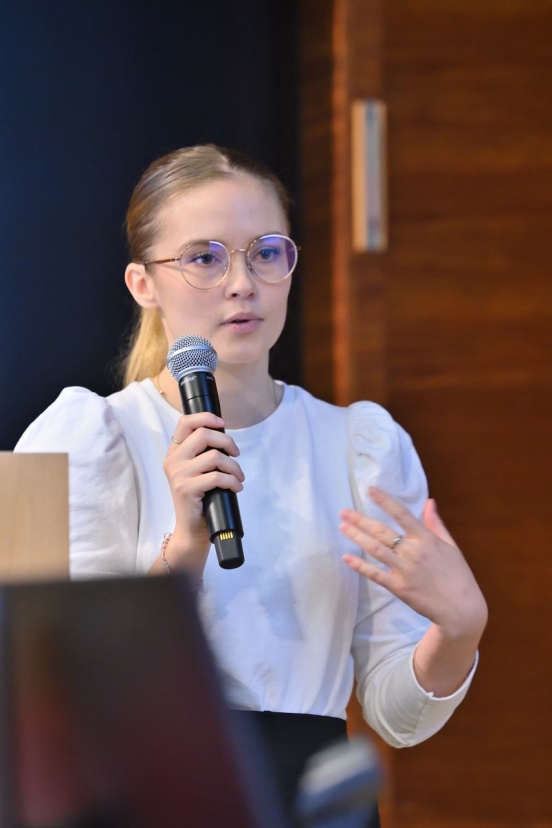
Tereza Sokolová at the SVOČ 2023 Conference
How did you, Tereza, come to be involved in scientific research?
I had been thinking about doing science for quite some time during my studies, however, I didn't really know how to get the opportunity. At the beginning of my fourth year, we received an email offering topics for Student Science Conference (SVOČ), and I was very interested in a project on febrile neutropenia, given my long-standing interest in issues related to haematological malignancies and their treatment. This was a pivotal moment for me that opened the door to other great opportunities and could be said to have started shaping my future medical path.
Can you please describe in more detail what the project on febrile neutropenia was about?
This was one of the largest retrospective studies of its kind, aiming to determine how different species of resistant bacteria colonising the gastrointestinal tract of a patient behave in febrile neutropenia and its treatment. We found that some species of resistant bacteria behave very invasively under these conditions, putting the patient at risk of sepsis, while other species exhibit the same behaviour as the non-colonised patient. Based on these findings, we proposed the implementation of de-escalation antibiotic therapy for febrile neutropenic patients with colonization of the gastrointestinal tract by resistant bacteria, in order to reduce the incidence of infectious complications associated with febrile neutropenia.
That sounds interesting, it's certainly not individual work, did you collaborate with anyone else on this research project?
I worked under the supervision of Associate Professor Jakub Radocha from the 4th Department of Internal Medicine – Hematology of the Faculty of Medicine and University Hospital Hradec Králové, to whom I am very grateful for the wonderful opportunity and the time he devoted to supervising this work. For this year (2024), we are continuing our collaboration with research looking at the toxicity of modern immunotherapy in the treatment of haemato-oncology patients, which although very revolutionary, also has its pitfalls.
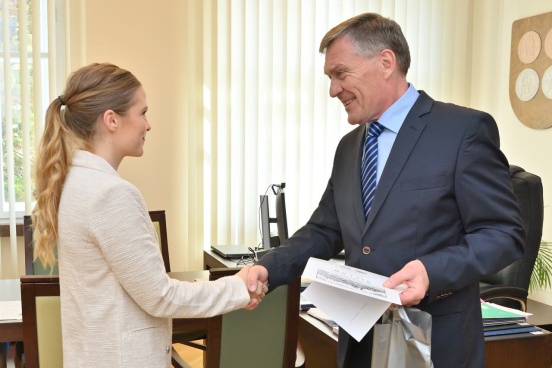
Diploma ceremony - SVOČ 2023
Last year you had the opportunity to go on a research fellowship at Mayo Clinic, where you spent three months, tell us more about that.
I worked on several projects at Mayo Clinic as part of the Lymphoma Epidemiology of Outcome (LEO), team under the direction of Dr Cerhan. The goal of the main project was to implement an appropriate comorbidity index for use in the lymphoma patient cohort there. These indices are a valuable tool not only for assessing health status, but also help to refine the prediction of various parameters in epidemiological studies – in our case, these were the overall and one-year mortality of the LEO cohort patients.
What specifically was your work as part of this team at Mayo Clinic?
I did a literature search on the topic, then based on that literature search I selected potentially appropriate comorbidity indices, compared data availability with the LEO cohort, and worked with the statistical team to develop models standing on the selected "Self-report Charles Comorbidity Index" to predict overall and 1-year mortality, including subsequent presentation of results at meetings and writing the first version of the manuscript in preparation for publication.
What do you enjoy most about research and science as such?
At every stage of the projects I have been involved in, from data collection, statistical evaluation, literature searches and writing the final manuscript, I have encountered something new and interesting, so I would like to continue to gain knowledge, skills and develop them in this way.
What do you think are the prerequisites for becoming a good scientist?
I do not dare to say what prerequisites one must have to become a good scientist, however, generally speaking, perseverance and especially patience brings results, not only in this field.
Is there anyone in the field of science and scientific research who has inspired you in some way? What?
I have great admiration for all health care professionals who have chosen to dedicate their lives to the treatment and care of patients. In the field of scientific research, apart from Associate Professor Jakub Radocha, I would also like to highlight Dr Cerhan from Mayo Clinic, who inspired and motivated me with his undying optimism and enthusiasm for research, leaving one with the impression that perhaps work can indeed be a hobby.
I guess sometimes you need to turn your head off, what do you do to relax?
I find the best relaxation is a sport or a good book (not a textbook :-) ).
As your studies are coming to an end, do we plan to continue to engage in scientific activities? What field would you like to pursue?
After finishing my studies, I would like to devote myself to scientific activity, especially in the field of hematological malignancies and the pitfalls of their treatment, with the aim of minimizing treatment complications and improving the quality of life of patients.
Another young female scientist we would like to introduce to you is Aneena Joshy, who is currently completing a degree programme General Medicine at our Faculty of Medicine. She also participated in the SVOČ conference last year, where she succeeded with her scientific paper on Hepatitis C virus Genotypes Prevalence in Eastern Bohemian region - 10 year retrospective study. Last year she also completed a research internship at Mayo Clinic, where she worked on the topic of DPYD gene mutation and its clinical implications. Her interest in cancer research, like many others, originally stemmed from a childhood dream to contribute to the search for a cure for cancer. However, despite this research focus, her main professional desire is to pursue cardiac electrophysiology.
What stereotypes are associated with women in science, what role patience, perseverance, but also ruthlessness or various prejudices play in scientific research, Aneena Joshy reveals in an interesting and open interview about science and women in it.
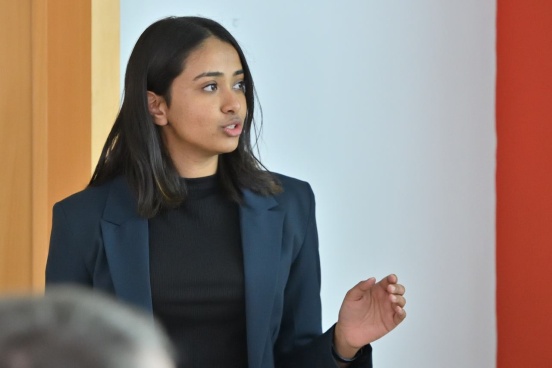
Aneena Joshy at the SVOČ 2023 Conference
What else are you doing now, Aneena, besides finishing your studies at the faculty of Medicine?
Yes, that's right, my main focus now is on finishing my state exams and at the same time I am working on case reports related to DPYD mutation research.
So now you are interested in oncology topics within science, can you tell us more about that?
My interest in cancer research, much like that of many individuals, initially stemmed from a childhood aspiration to contribute to the pursuit of a cure for cancer. Over time, however, my perspective on the field of oncology has evolved, leading me to focus on gaining a better understanding of the efficacy and adverse effects of chemotherapeutics currently being used. Specifically, I aim to explore genetic mutations that could make these treatments fatal for certain populations. My goal is to contribute to advancing our collective understanding of cancer treatment, ultimately impacting healthcare practices. Despite this research focus, my primary career aspiration is to become a cardiac electrophysiologist, driven by both personal and professional motivations.
What are the major qualities required to be a good scientist?
I believe that patience is the most important quality in a scientist. We often face challenges that are difficult, if not impossible to overcome. Not every experiment is meant to pan out, and we may not get the results we want. In spite of this, it is essential to keep pushing forward and trying again. Perseverance is vital in a scientist in order to achieve their set goals.
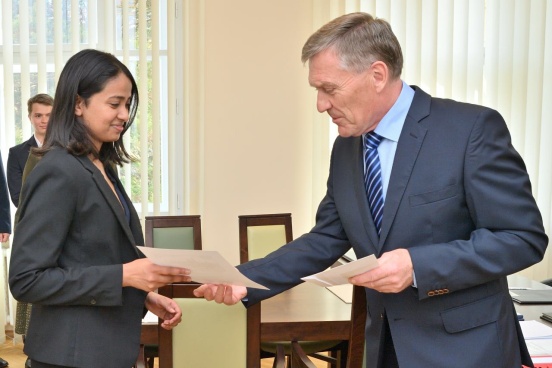
Diploma ceremony - SVOČ 2023
What do you think people think of when you say female scientist?
People have a tendency to underestimate females in general, let alone in a field as competitive as science. Being a female means you’re often sidelined and your potential ignored in favor of your counterparts simply because of existing stereotypes. I’ve had the opportunity of meeting some amazing female scientists who have been nothing short of powerful and inspirational. In my opinion, scientists pour their heart and soul into their research and are deserving of credit based on merit, and not their sex.
What is the stereotype of a female scientist (if something is)?
I feel that women are seen to be less dedicated than their counterparts. Women are considered passive, indecisive, and lacking of the grit it takes to make it to the top. They are thought to have less interest in scientific pursuits as they lack the ruthlessness required for competition. Prejudices like these make it tougher for women to succeed in their fields, qualified though they are. It also discourages other women from pursuing their passion, simply because others before them have failed.
Were there any female scientists in particular who inspired you to pursue a career?
During my schooling, one of the scientists that particularly caught my attention was Rosalind Franklin. While Francis Crick and James Watson are infamous for their discovery of the double helix model of the DNA, few people know of the biochemist whose X-ray photographs of DNA directly contributed to this major breakthrough. Rosalind Franklin dedicated her life to science, and yet did not receive any attention or credit for it when she was alive. While her co-workers received a Nobel Prize, her name remained in the dark. She died at the age of 38 of ovarian cancer, after a short but significant life of scientific research and discovery. Rosalind Franklin is a name that should have gotten more recognition than it did, and her story always struck a chord with me.
What advice would you give to other women (considering a career) in science?
For women considering a career in science, my advice would be to embrace your passion and pursue it fearlessly. Seek out mentors and role models who can provide guidance and support along your journey. Most importantly, advocate for yourself and for other women in science, and strive to create a more inclusive and equitable environment for future generations.
The last of the trio of female scientists we would like to introduce as part of the International Day of Women and Girls in Science in 2024 is Dr. Kateřina Krylová, who works at the Department of Pediatrics of the Faculty of Medicine and University Hospital HK.
Dr. Krylová's research focuses on the very youngest patients, working with premature and term newborns to validate foreign research in our population. In science, she believes that not only curiosity and patience are important, but also resilience in case of failure. Coming from a scientific family, she also works with students, especially in the Simulation Center.
We talked about these topics, as well as other issues, such as what people think of when they hear the word "female scientist" or what Kateřina Krylová's message is to future female scientists, in the following interview.
Dr. Krylová, can you give us a little background on your work at the pediatric clinic?
Currently, I mainly focus on neonatology while working at the Perinatology Centre at the University Hospital HK, where we have acute and follow-up care for premature and term newborns. At work, I try to think about the application of current research findings and also get involved in validating foreign research in our population. Hence, the focus of my clinical research activities in the maternity ward and in working with premature newborns in the risk clinic of the Department of Pediatrics to apply new practices and EBM (Evidence Based Medicine) in daily practice to improve the care of the youngest patients. We are not a large department, so we focus on smaller projects.
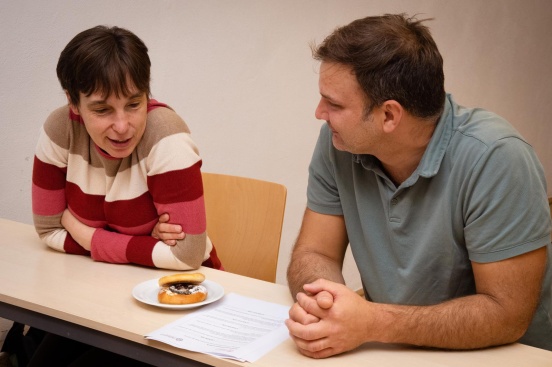
Dr. Krylová during the Teaching Skills Seminars in 2021
What do you enjoy most about research and science in general?
What I enjoy is connecting science with practice. To learn new things, to test how they work and to know that it is all practically applicable.
What qualifications does one need to be a good scientist?
I think that for science you need curiosity, the ability to think about a problem from different angles, patience, perseverance and of course resilience to possible setbacks. Science nowadays is not about one genius, but about a well-coordinated team involved in each step of a research project.
What do you think people think of when you say female scientist?
They probably think of a very smart but impractical and eccentric person...
Is there anyone in the field of science and scientific research who has inspired you in some way?
I have examples in my family – my father in particular has been involved in science all his life, and although he is involved in other subjects, I can consult him on some things. It is also very inspiring to see the results of other colleagues' work and to discuss with them at professional congresses, especially abroad.
I guess sometimes you need to switch off your head, what do you do to relax?
The best way to clear my head is to work in the garden and to be active in music; playing the organ opens up other worlds.
What would you like to do next in your scientific work?
I want to continue my long-term research on babies who are born prematurely. It is necessary to monitor their further development so that follow-up care is sensitive to their peculiarities. At the same time, I would like to gradually involve young colleagues and possibly medical professionals in my research.
What advice would you give to women considering a career in science?
Don't hesitate to give it a try. Clinical research is needed and you can apply its results directly to your daily practice.